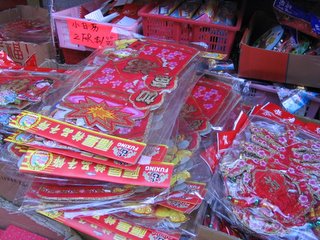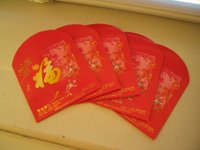Chinese Lunar New Year Part 3: Customs
 Lion Heads/Lion Dance/Dragon Dance
Lion Heads/Lion Dance/Dragon Dance
I’m sure you’ve seen a lion dance performed in person or on television. In Chinese culture, lions symbolize protection and goodness and they aren’t limited to being performed during the Lunar New Year either—owners will have them at business openings and couples will invite them for their wedding celebrations.
The lions’ heads are actually based on Tibetan dog heads rather than an African lion head. The dances are normally performed by Chinese dance troupes or martial arts groups. It requires two dancers, one maneuvers the head and his partner moves like the body of a lion behind him, covered by a large swath of fabric that is connected to the lion head. The performances require musicians to play the drums and cymbals and the lion should be accompanied by a smiling monk named Mi To Fu who holds a leaf of lettuce and lures the lion through the dance. The dance’s finale entails the lion grabbing the leaf in its mouth and then spitting it back out again. Why does the lion do this? Once again, homophones are at play—the word “green” in Chinese sounds like the word “shared prosperity,” so eating the lettuce and spitting it sends out good fortune to the community or the new business or the newlyweds. Decorations
Decorations
Couplets are poetic and lucky proverbs that represent good wishes for the new year. Normally they are written with black ink on vertical strips of red paper. They are hung on either side of a door or in window, entrance or hallway. Some of the most common messages: May you have good health, May the Star of Happiness/ the Star of Wealth/the Star of Longevity Shine on you.
 When I took a quick look through the flower market this year I noticed these elderly Chinese gentleman writing couplets for passerbys. And then I noticed they were sponsored by Foxwoods Casino! Need luck for the craps table anyone?
When I took a quick look through the flower market this year I noticed these elderly Chinese gentleman writing couplets for passerbys. And then I noticed they were sponsored by Foxwoods Casino! Need luck for the craps table anyone?
Fu 福
 The character “Fu” in Mandarin or “fook” in Cantonese means fortune. During the Lunar New Year season families hang signs with this single character on doors, entrances and anywhere else in their home in order to bring in fortune. In the northern areas of China, the “fu” is hung upside down to suggest that luck as already arrived because the word for “upside down” and “to arrive” sound very similar in Mandarin. However, in southern Chinese dialects the words aren’t similar and therefore families from the south many not hang their signs upside down.
The character “Fu” in Mandarin or “fook” in Cantonese means fortune. During the Lunar New Year season families hang signs with this single character on doors, entrances and anywhere else in their home in order to bring in fortune. In the northern areas of China, the “fu” is hung upside down to suggest that luck as already arrived because the word for “upside down” and “to arrive” sound very similar in Mandarin. However, in southern Chinese dialects the words aren’t similar and therefore families from the south many not hang their signs upside down.
Red Envelopes (Hong bao/laisee)  During the Lunar New Year adult members of the family will give small red envelopes filled with a bit of money to their children (or grandchildren). Money is normally given out in even numbers with the exception of “four” because the word sounds like the word for “death.” The children are persuaded to save their money until the next year so that they may maintain their luck through the year. The family hopes to entrust the family luck by giving out these cute red envelopes to their children. Most envelopes are decorated with emblems of luck such as the character “fu” for fortune or peaches and oranges that symbolize prosperity.
During the Lunar New Year adult members of the family will give small red envelopes filled with a bit of money to their children (or grandchildren). Money is normally given out in even numbers with the exception of “four” because the word sounds like the word for “death.” The children are persuaded to save their money until the next year so that they may maintain their luck through the year. The family hopes to entrust the family luck by giving out these cute red envelopes to their children. Most envelopes are decorated with emblems of luck such as the character “fu” for fortune or peaches and oranges that symbolize prosperity.
The Kitchen God  A domestic deity, the Kitchen God lives in the stove of every family and watches over them throughout the year. Many Chinese family kitchens acknowledge his presence with a wooden figurine, a plaque or piece of paper with his image or name on it that sits above or near the stove. A week before the Lunar New Year, the family will remove that image and burn it thereby sending his spirit to the heavens were he will report to the Jade Emperor about the family’s behaviour over the past year. Sweet and sticky foods are offered to the Kitchen God at this time so that his mouth will be so full and gluey he won’t be able to open it and verbalize his report. Some examples of the foods that are offered: honey, molasses, sticky rice and sweet treats I mentioned in my last post like Nian Gao.
A domestic deity, the Kitchen God lives in the stove of every family and watches over them throughout the year. Many Chinese family kitchens acknowledge his presence with a wooden figurine, a plaque or piece of paper with his image or name on it that sits above or near the stove. A week before the Lunar New Year, the family will remove that image and burn it thereby sending his spirit to the heavens were he will report to the Jade Emperor about the family’s behaviour over the past year. Sweet and sticky foods are offered to the Kitchen God at this time so that his mouth will be so full and gluey he won’t be able to open it and verbalize his report. Some examples of the foods that are offered: honey, molasses, sticky rice and sweet treats I mentioned in my last post like Nian Gao.
The Do’s and Don’ts of the Lunar New Year
There are lot of superstitious traditions that many Chinese continue to practice every year. Here are a few:
- Don’t get your hair cut on New Year’s Day because sharp objects like scissors could possibly cut your luck
- Don’t wash your hair either on New Year’s Day because you don’t want to wash your luck away
- Don’t sweet the floors or good fortune will be swept away
- Don’t argue on New Year’s Day because the negativity (or harmony) you show on this day will follow you through the year
- Do wear red and don’t wear black
- Do Wear jade jewelry to increase your good luck
So now you know what to eat, say, decorate and wear for next year! I hope you have enjoyed reading about popular Chinese Lunar New Year traditions as much as I have had in writing about them.
For this week's Weekend Dog Blogging event, held by Alicat at Something So Clever this week, D has a special message:
 *Yawn* ...all this celebrating for the Year of the Dog can wear out an 'ole pooch like me. Woof to peace and prosperity, but I need a nap folks.
*Yawn* ...all this celebrating for the Year of the Dog can wear out an 'ole pooch like me. Woof to peace and prosperity, but I need a nap folks.** Much of my information are sources from tour guide materials provided by MoCA.

7 Comments:
great note on that non food CNY stuff.
I love these posts - Two years ago I spent Chinese New Year in San Francisco and reading this gave me a much better understanding of some of the traditions I observed!
foodcrazee: Thanks for visiting my little 'ole blog :-)
mebeth: Thank you. I really hope it helps non-chinese and even some Chinese a better understanding of the meanings behind all the traditions.
hahahaha! Even as a Malaysian Chinese , i still have lots of things to learn ....too many superstitious thingy and tradition.
Cheers !
and u r most welcome, Rose
Rose,
thanks a lot for our interesting posts! I am just linking them in an entry about sichuan rabbit recipes for the chinese
new year blog event
The new year is always a great time and if your lucky enough to celebrate the western and Chinese new year thats even better, this year I got my partner a piece of diamante jewellery to celebrate the new year and she loved it.
I also got my partner some jewellery which I got and she loved it also. I don't think that it is necessaryily in the spirit of New Year but I got it from a wholesale jewellery company with a chinese engaving on it speially and it looks lovely.
Post a Comment
<< Home